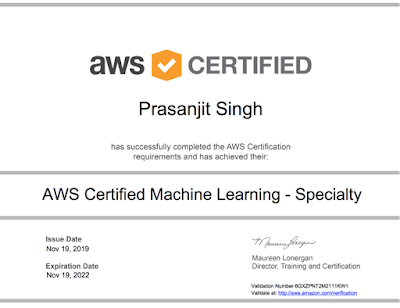I must admit that the sense of accomplishment after clearing the "AWS Certified Machine Learning Specialty" exam and the adrenaline rush when you hit the submit button is slightly addictive!
This one is special because it is my first certification from AWS and being a DevOps Engineer, it would have been easier for me to take the "AWS Certified Solutions Architect" or the "DevOps Engineer" track instead of exploring less familiar terrain of "Machine Learning". However, stepping out of the comfort zone to learn something new made it even more fulfilling.
This post is about the learning path I followed in the run-up to this certification.
Machine Learning in itself is a vast field and this course, kind of scratches the surface and gets you started.
In summary, you will need to know the following to clear this exam:
How to identify the problem (Supervised, Unsupervised, Classification, Regression)
How to choose the algorithm (Linear models, CNN, RNN, Tree Ensemble)
How to train your model
Data preparation & transformation
How to use AWS ecosystem to solve the above
Distribution of Questions Asked:
The topic-wise weightage of the questions asked was as follows:
The total time to complete the exam was 3 hours
There were 65 questions asked
I got started with watching `AWS Tech Talk` and `Deep Dive` videos on Youtube, not just about ML but about related services as well: https://www.youtube.com/channel/UCT-nPlVzJI-ccQXlxjSvJmw
Followed the free training videos and tutorials from AWS (not all of them though): https://aws.amazon.com/training/learning-paths/machine-learning/exam-preparation
ML/DL needs some high school/college level mathematics to be revisited. Basically, Linear Algebra, Probability & Statistics, Multivariable Calculus and Optimization, worked for me.
Data Visualisation using Jupyter notebooks.
Regression and gradient descent.
DL Models - CNN, RNN
Worked on understanding the following concepts-
Supervised, unsupervised and reinforcement learning.
Purpose of training, validation and testing data.
Various ML Algorithms & Model Types-
Logistical Regression
Linear Regression
Support Vector Machines
Decision Trees / Random Forests
K-means Clustering
K-Nearest Neighbours
Once the above concepts are understood go ahead with trying out the following AWS services-
SageMaker
Rekognition
Polly
Transcribe
Lex
Translate
Comprehend
S3 including how to secure your data
Athena including performance
Kinesis Firehose and Analytics
Elastic Map Reduce (EMR)
AWS Glue
QuickSight
Those of you who regularly use AWS services won't have much of a problem grasping these.
Finally, try practicing a lot of practice exam questions like ones from the link below:
https://www.udemy.com/course/aws-machine-learning-practice-exam/
You should also have a go at the official practice exam before going for the mains. So that was it folks. I am still learning this discipline, and it's all volatile right now. I will feel more confident with ML once I start applying it in some real-world applications. Will write about those experiences as they come by.

Hi, First of all Congratulations to you !!
ReplyDeleteI am working as Teradata DBA and also completed a Masters Program in Data Science recently. I dont have any Cloud experience or knowledge and hence of thinking of starting with AWS in Udemy. As a DBA, most people recommend me AWS Solution Architect but I want to start with AWS Machine Learning. Can you please advice what would be good for me as a beginner and zero cloud knowledge? SHould I start with AWS ML first ?
Thanks in advance.
Hi, thanks for the support! Since you are already into Data Science, it would be great if you pursue the AWS Machine learning certification.
DeleteHowever, I would advise you to have some hands-on experience with various AWS services and tools before jumping in for the ML exam. And by "hands-on AWS experience"I donot mean appearing for the AWS solutions architect exam, but having a good understanding of the services and their usage. That will help you model better ML solutions in the AWS ecosystem.